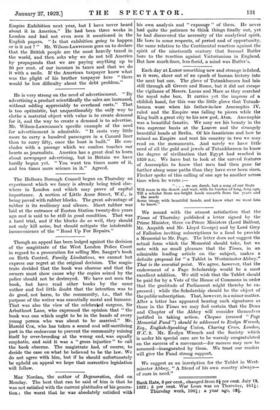Each day at Luxor something new and strange is fished,
as it were, sheer out of an epoch of human history into the next but one. The glove of Tutankhamen had lain still through all Greece and Rome, but it did not escape the vigilance of Messrs. Lucas and Mace as they searched the royal robe box. It carries yet the impress of a childish hand, for this was the little glove that Tutank- hamen wore when his father-in-law Amenophis IV. ruled and the Empire was falling to pieces while the King built a great city to his new god, Aton. Amenophis was a beautiful fanatic. We may see his beauty in the two supreme busts at the Louvre and the strangely beautiful heads at Berlin. Of his fanaticism and how he ruined an Empire and rent his country in two we may read on the monuments. And surely we have little need of all the gold and jewels of Tutankhamen to know the degree of civilization that Egypt had reached in 1850 s.c. We have but to look at the carved features of Amenophis to know that men had then gone far further along some paths than they have ever been since. Flecker spoke of this calling of one age to another across time when he wrote :— . . . we are dumb, but a song of our State Will roam in the desert and wait, with its burden of long, long ago. Till a scholar from sea-bright lands unearth from the years and
the sands Some image with beautiful hands, and know what we want him to know."










































 Previous page
Previous page